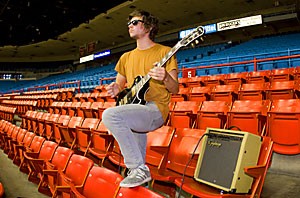When Franz Ferdinand, an internationally known rock band notorious for its boisterous live performances, took the Centennial Hall stage in March 2006, something was missing.
The band members channeled all the energy of a world-class group, but their dynamism seemed trapped inside the stifling walls of the overly formal venue. There were no mosh pits, no crowd-surfing, not even an opportunity to pull out a lighter for a ballad. The audience remained standing in front of specially assigned chairs, fixed on the carpet that bound them.
Flash back 30 years ago.
An Aug. 27, 1977 Fleetwood Mac performance at the football team’s Arizona Stadium lured 67,000 fans and was reported as “”the largest crowd of rock fans in Arizona history.”” That record-breaking performance has influenced ASUA as it chooses concerts to bring to campus this year.
Over the past two years, ASUA’s special events team has been able to get such popular musicians as Rufio, Death Cab for Cutie, Franz Ferdinand, Jason Mraz, Talib Kweli, The Fray and the Plain White T’s to captivate UA crowds.
Special events director Andrew Stanley said the success of getting Death Cab for Cutie and Franz Ferdinand to play together at Centennial Hall revamped ASUA’s attitude about booking performers.
“”(The Death Cab show) was a realization for us and the students that it is possible to get amazing shows on campus,”” said former ASUA special events director Kristen Maryn, who held the position in 2006-2007.
Maryn said the Talib Kweli’s April concert at Centennial garnered different reactions from students.
“”They either showed gratitude for us bringing hip-hop or had no idea who Talib Kweli was,”” Maryn said.
Nonetheless, Kweli represented a refreshing change in entertainment on campus and showed ASUA’s desire to represent students who like other genres besides the “”sweater bands,”” as Maryn called them.
Stanley’s goal is to match the Mac performance with a show at Arizona Stadium this coming April. His attendance goal: 15,000.
“”I feel that I would be letting the students down if I didn’t try for (a stadium show),”” Stanley declined to mention which artists ASUA is considering, saying he wanted to make sure he keeps his options open.
But, he added, “”it’s going to be big this year, just watch out.””
The curiosity of the moment is whether venues around campus today are being used to their utmost potential.
The available venues on campus for potential performances are Centennial Hall; the Grand Ballroom in the Student Union Memorial Center; the UA Mall; Frank Sancet Stadium (baseball); McKale Center (basketball); and Arizona Stadium.
Centennial Hall holds about 2,500 people and has showcased such artists as the Plain White T’s, The Fray and Talib Kweli in the past. While the hall is a popular venue for bands on the UA campus, the special events team views it as more of a restriction.
Stanley said he wonders what direction the team will take next fall, when the athletic department’s new practice facility is slated for completion just northeast of McKale Center, 1721 E. Enke Drive.
“”Soon we’ll start to benefit from having that extra venue there so we are not just restricted to Centennial Hall and the (Grand) Ballroom,”” he said.
One of the most difficult challenges to filling these venues with popular artists is actually being able to contact their agents and book a date, Stanley said. While some would assume a band like Green Day, popular among college students, would be interested in playing a campus show, the group’s reaction was in fact quite the opposite.
“”A few years ago we were looking to get Green Day, and they just don’t do college shows,”” Stanley said. “”Bands that you know that would sell out in a heartbeat or do well aren’t always available.””
Some people assume that “”if you give an artist enough money, then you can get them,”” Stanley said. “”It’s just not that easy.””
Many ASUA members are thankful for past performances, given that Tucson isn’t the most desirable of cities to visit, said ASUA President Tommy Bruce.
“”We are not a major stop in most tours,”” Bruce said.
Although McKale Center, which has a capacity of 14,545, is an open venue for musicians and artists to perform, there has yet to be a concert there.
“”The Arizona Athletics program is very supportive of the idea of a concert in McKale,”” Bruce said. “”It is just the restrictions that there are to get a date available to use in McKale.””
Maryn, having booked artists to play for the UA in the past, explained that the process is not as simple as some may think.
“”The university is incredibly bureaucratic, so you have to go through so many steps to get to the actual artist,”” Maryn said.
“”From the artists’ perspective, you are working with people who are not technically professionals so they don’t really see it desirable to work with someone who is not necessarily highest in resources,”” she said.
Maryn said many bigger artists simply are not interested in doing college dates, and that factor can make it difficult for an agent to even consider a college show for their client.
“”They look at it as, ‘These students are going through a learning experience. Why do we want to deal with them when we can go to a professional venue?'”” she said.
Stanley said the most difficult part of being special events director “”is getting events that different groups of students like so we are not just doing the same thing over and over again.””
Maryn noticed a similar importance of offering diversity in music.
“”The artists we bring should mirror the student body,”” Maryn said.









